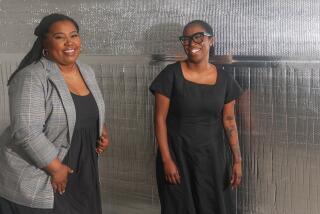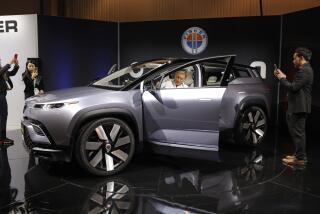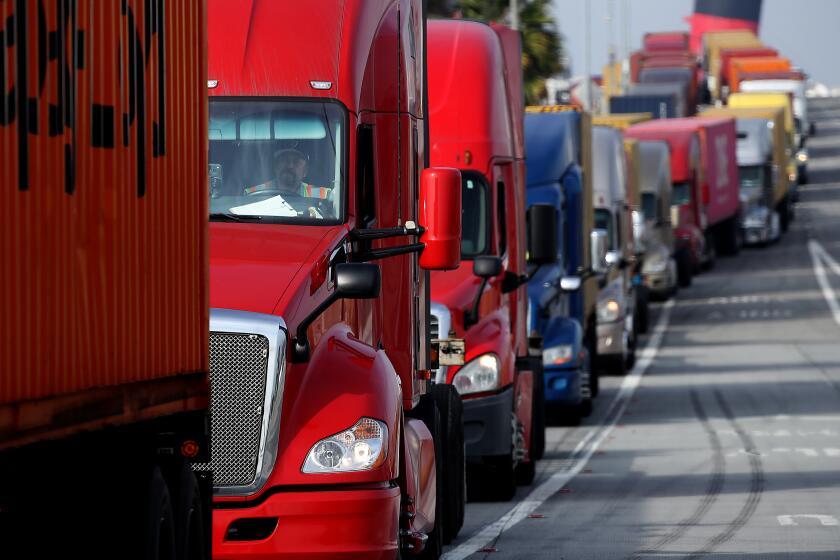Is electric car start-up Faraday Future already running out of cash?
Nevada’s state treasurer has a message for electric car company Faraday Future: Show me the money. The company building a $1-billion factory for Faraday in Nevada has a similar message: Pay up now.
Money problems appear to be plaguing the secretive Gardena-based start-up, which is trying to rival Tesla and other automakers.
Faraday hasn’t paid $21 million due in September, with bills totaling an additional $25 million due for October and $12 million for November, according to Aecom, a multinational engineering firm. The Los Angeles company is the prime contractor for Faraday’s car factory under construction in North Las Vegas, which, if completed, is expected to turn out 150,000 cars annually.
Faraday also owes a $75-million performance bond to the state of Nevada.
Start-ups often run into schedule delays and financial hiccups. Just look at Tesla — the electric carmaker almost went bust before its Model S hit it big. Even now, it continues to face questions about cash flow and is notorious for product delays.
But does what’s happening at Faraday count as a minor setback or does it mark the start of a dangerous slide that puts the entire company at risk?
The privately held company doesn’t release its finances. In a statement, it said that “the business relationship between AECOM and FF is strong, and we remain committed to building our factory in N. Las Vegas.”
But in an Oct. 10 letter to Faraday, first revealed by Automotive News, Aecom warned that work on the site could be halted if it doesn’t get its money.
Faraday plans to build an electric passenger car packed with technology but has offered no timeline for production. It has shown off a couple of concept cars and plans to unveil its production car in January.
Michelle Krebs, senior analyst at Autotrader, said whatever Faraday’s financial condition, starting a new car company is a high-risk endeavor.
“The auto industry is an incredibly complex, very competitive, highly regulated and capital-intensive business, so it is amazing when newcomers announce they are starting a car company,” she said. And, “with gas prices falling to about $2 a gallon – below that right now in some places – electric vehicles and various kinds of hybrids are a tough sell right now.”
Nevada’s state treasurer, Dan Schwartz, is wondering whether Faraday has a future.
“My sense is we’re not getting the whole story, and that really is the issue,” he said. “I’m not persuaded that the money is there to complete the project.”
“My questions are all about how they finance this,” he continued. “I’m afraid it will never be financed and implode in the middle” of the project, leaving Nevada taxpayers on the hook for millions in state incentives offered to Faraday.
At the center of Schwartz’s concern is Jia Yueting, the Chinese entrepreneur backing Faraday Future.
Schwartz, who traveled to Beijing in February to learn more about Jia and has been studying his activities since then, said Jia finances Faraday with borrowed funds that are backed by shares in Leshi Internet Information & Technology Corp., a company he founded.
“The stock is worth [about] half of what he started with,” Schwartz said.
Currently trading at about $6.80 a share, it’s down 45% from its high in May last year. From December 2015 to June this year, the stock didn’t trade at all — it was suspended at the company’s request for reasons that remain unclear.
Faraday’s bill payment problem with Aecom demonstrates, at the very least, a cash-flow issue.
Aecom needs the cash to buy materials and pay subcontractors at the Faraday factory site, set on a bleak alluvial landscape in North Las Vegas near Nellis Air Force Base. Construction hasn’t begun.
Aecom deferred questions to Faraday.
Faraday must post a $75-million performance bond before the state issues bonds to pay for infrastructure around the site, including roads, water lines, electric connections and sewer pipes, Schwartz said.
In a special session in December, pushed by Nevada Gov. Brian Sandoval, the state legislature granted Faraday a $335-million incentive package, including $215 million in tax breaks.
There will be no infrastructure without the performance bond, Schwartz said. “My position is if these bonds aren’t going to be paid, I’m not going to issue them,” he told a local radio station this year.
The company had told him it expected to post the bond by September, “but right now they’re just pushing dirt around,” Schwartz said. Workers are currently grading the 900-acre site to prepare for construction.
The plant, if built, is expected to cost $1 billion over 10 years and employ about 4,500 workers.
Twitter: @russ1mitchell







